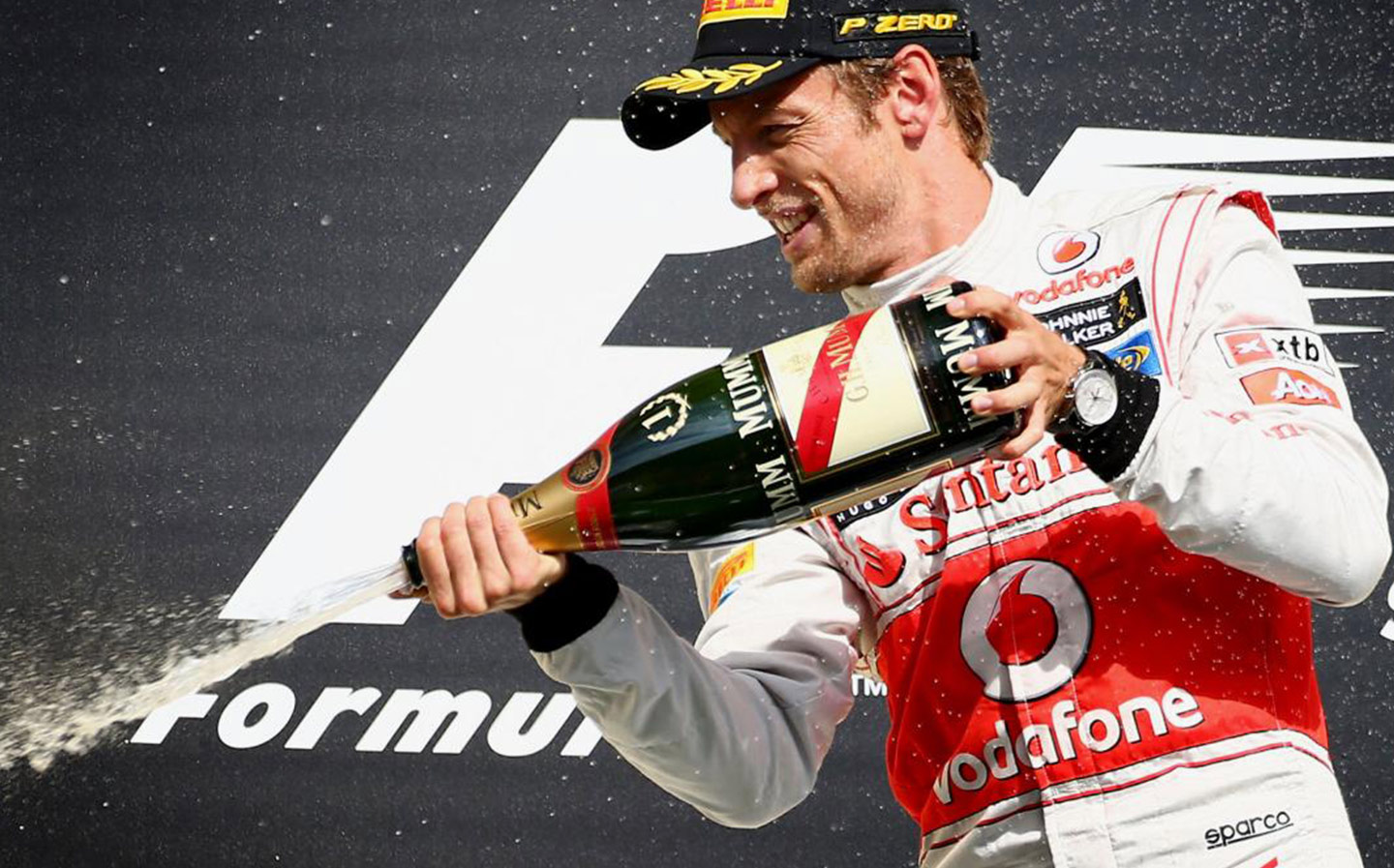Jenson Button on quitting F1, Richard Branson and his father’s death
Jenson Button was Britain’s playboy world champion — a 21st-century James Hunt. He tells Nick Rufford why he ran out of steam
JENSON Button’s career in Formula One was ended by a head injury. But it wasn’t his. It killed his father, John, the man who inspired and mentored him. John Button was widely reported to have died from a heart attack, aged 70, but the truth is more cruel. He sustained a head injury while falling down some steps and never recovered.
Button says that his father’s death in 2014 left him bereft and his love for F1 racing died with him. “He was there every inch of the way,” he recalls. “I wouldn’t have started karting if it wasn’t for him, I wouldn’t have gone into single-seaters and I definitely wouldn’t have got into Formula One.”
Today the former world champion is sitting next to the pool in the garden of his new California home, looking lean and tanned. He hasn’t lost his boyish looks, but this is a more serious Button. The scars from the accident in 2014 are hidden, but they haven’t healed and, he says, have changed his life permanently.
Browse NEW or USED cars for sale
On the surface, that life looks pretty good. As well as the Los Angeles house he has an enviable collection of cars, including a £1m McLaren, a 1956 Volkswagen camper van and a 1970 Ford Mustang. There are also two dogs, Storm and Rogue (named after the X-Men characters).
His girlfriend is Brittny Ward, a model, whom he’s very happy with. He got together with her after divorcing Jessica Michibata — also a model — after less than a year of marriage and moving from Monaco earlier this year in a midlife crisis that would have impressed Charlie Sheen.
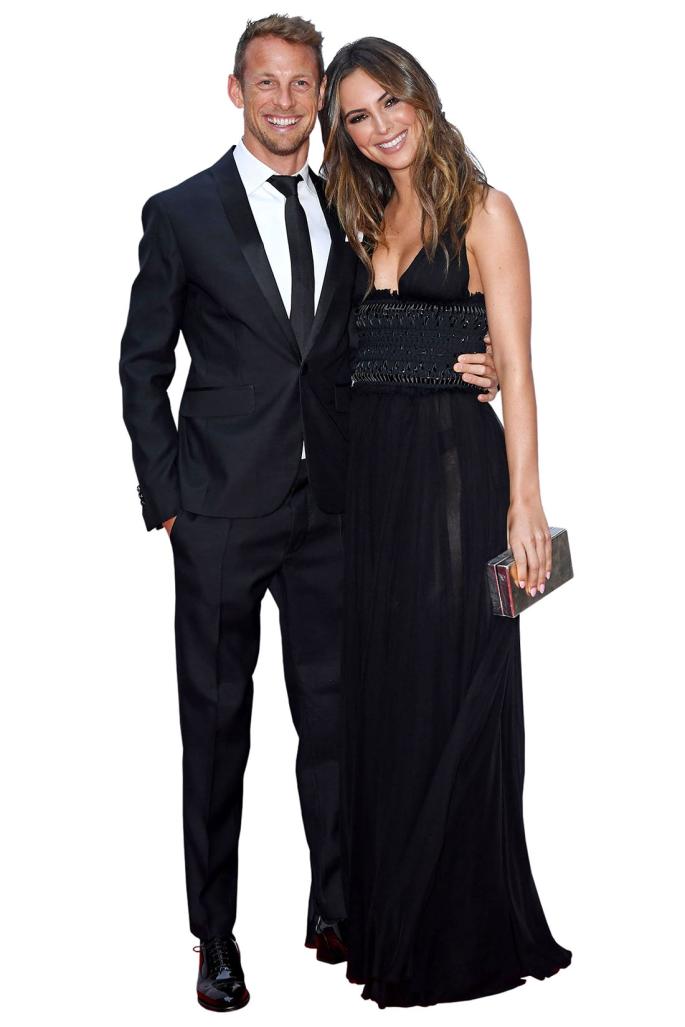
Model behaviour: Button with Brittny Ward, his girlfriend
XPOSURE
Officially, he’s taking a year off from driving as an ambassador for his team, McLaren, while concentrating on “other things” in his life. But he now admits — for the first time publicly — he won’t be returning to F1, though he will remain in motor racing.
“I’ve still got an option to race next year, but I’ve done my time in Formula One,” he says. “I’ve been travelling with the circus for 17 years and it’s enough for me.”
F1 drivers come and go all the time, but Button will be missed. He was the youngest British driver to enter the sport and his string of victories made him an inspiration, especially to youngsters, at a time when F1 was more about raw speed and less top-heavy with rules.
They say rock’n’roll is one long primal cry of “Daddy!” Maybe motor racing is too.
In 2009 he won six of the first seven races and went on to take the drivers’ championship. When he was partnered with Lewis Hamilton in the McLaren team, he beat his British rival on points overall, and in 2015 he outpaced Fernando Alonso, the Spanish former F1 champion, on points, the only teammate ever to do so. In terms of grand prix wins, he ranks among the best British racing drivers of all time, ahead of John Surtees and Graham Hill.
Dave Richards, chairman-elect of the Motor Sports Association, who recruited Button to the British American Racing team in 2002, says he has earned his place in the annals of racing history.
“In the past 15 years he has matured into somebody who I would say has become one of the great drivers. He’s a world champion and he was also a great personality for sponsors, and that often lasts longer than pure driving ability.”
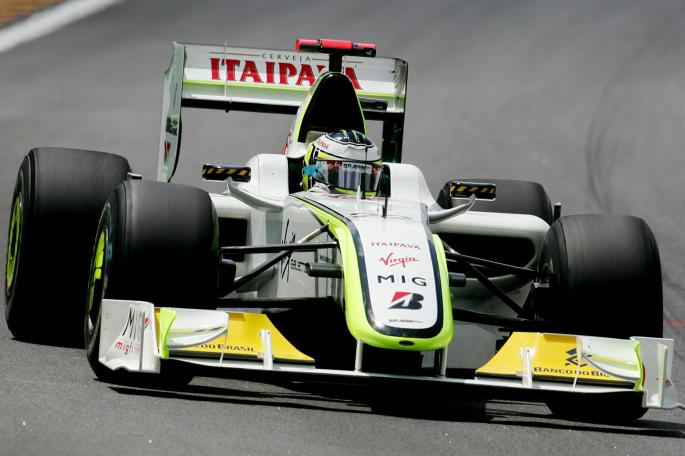
Lap of honour: Button wins the world championship in 2009 in Brazil
PICTURE ALLIANCE
More recently, with fewer podium places to his name, Button has had less media coverage for his driving and more for his relationships, including a well-publicised break-up from Michibata and headlines about Ward’s modelling career. She was one of the late Hugh Hefner’s Playboy Playmates and a former Ultimate Fighting Championship ring girl, with a tattoo that reads “Strong willed”.
Yet it’s a peculiarity of British culture that sports stars are, by turns, discovered, lauded and applauded and then regarded as gossip fodder. Early in Button’s career his good looks made it easy for critics to write him off as a pin-up and lightweight, as they did in the 1970s with James Hunt, a driver whose true talents were recognised only posthumously.
Before Button won the world championship he was dismissed as a nearly man — the Tim Henman of motor racing — and his former teammate Jacques Villeneuve compared him to a boyband member. Flavio Briatore, his team boss at Benetton, called him a “lazy playboy”.
Button will be glad to leave the critics behind, he says, but he denies that’s why he’s giving up. His autobiography, Life to the Limit, published this week, reveals for the first time the impact of his father’s death.
“Things just weren’t the same afterwards,” he writes. “My love of racing remained but my love of Formula One was lacking. I found myself treading water, looking for meaning and purpose but failing to find it. Dad always looked as though he was having a great time, and it was contagious. Life without him was as if laughter had been banned, or music had ceased to exist. All colour had drained away.”
Button Sr was a one-time rallycross driver who separated from his wife when Jenson was seven years old, moving out of the family home to a tiny flat. The next Christmas he presented his son — Jenson was the youngest of four, but the only boy — with a gift-wrapped racing kart. Jenson loved it, but most of all he loved the bond it created between him and his father. At weekends they travelled to windswept circuits, where his father would stand on a corner of the track and shout instructions.
“He was my No 1 mentor and always will be,” Button writes.
“He guided me, not by cajoling or insisting, but by coaching and nurturing. [He taught me to] be smooth and precise, to find the racing line.”
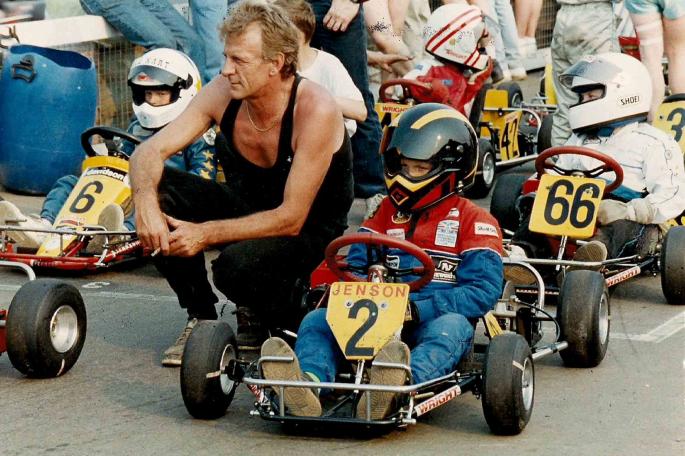
Jenson, aged 10 in 1990, with his late father, John
Jenson was a natural, and kart racing gave him a confidence he lacked at school, where he was “the shuffling little dork who gets picked last for football”. He learned early the perils of motor sport when a nine-year-old friend was killed in a karting accident. Later, Dan Wheldon, a contemporary from his days of racing single-seaters, crashed and died during the IndyCar world championship in Las Vegas. Both events were hard knocks but made Button a tougher competitor.
To find the £6,000 a year it cost to support Jenson’s endeavours, his father sold everything he had, including his car dealership, and opened a shop in Frome, Somerset, called Rocket Motorsports. He made engines, both for his son’s karts and for those of other youngsters — including an aspiring racer called Lewis Hamilton. Money was tight, Button recalls, and his father occasionally had a whip-round at the track to afford fuel for the Ford Transit van — painted in Rocket Motorsports colours — that transported them to race events.
By the time of his death, his father was among the most influential parents in sport, the motor racing equivalent of Judy Murray (mother of Andy and Jamie) and the undisputed boss of team Button. He attended all his grand prix races, missing only one because of illness. It was his father that Button embraced first at the Interlagos racetrack in Brazil after he had won the drivers’ championship.
They say rock’n’roll is one long primal cry of “Daddy!” Maybe motor racing is too.
One day in 2014, when Jenson was in Los Angeles, he got a phone call from France from Richard Goddard, his manager. Goddard had gone to look for Button’s father after he failed to respond to phone calls. He discovered him on some steep steps leading to the front door of his house in
Cap-d’Ail in the south of France. Button Sr had slipped on the concrete, striking his head.
Button says his father, who was diabetic and at times unsteady on his feet, may have fallen twice that evening, the first time while walking back to his car after an evening out in Monaco. “When we saw CCTV from the car park, he had blood on the back of his head,” he says. “There was also a little blood found on the headrest of his car. He made it to Cap-d’Ail. We don’t know how it happened, but we do know he let himself in, but the gate [to the steps] shut behind him and his keys were on the other side of it. There was a little granny flat, a tiny one-room apartment, halfway up the stairs, and, judging from some blood on the pillow, he lay down in there for a bit.”
Button continues the story after a pause. “Either he needed his insulin, or water, or something, and tried to go up the stairs [to the main house]. ” In the book, Button adds: “He was returning down the steps when he fell forward and hit his head for a second time. This one proved fatal.”
After his father’s death, Button went back to racing. “I did what I do,” he recalls. “I went back to work in testing with McLaren. What was I supposed to do?” But the will to win had gone.
One thing Button will be missed for is his simmering feud with Hamilton, who is dominating this year’s world championship. At its height, the rivalry between the two British drivers echoed the great duels between Alain Prost and Ayrton Senna, and Hunt and Niki Lauda, and restored some of the old magic to F1.
“He’s a brilliant, mercurial driver,” Button says of Hamilton. “Like me, I think he probably coasted on talent at first, and, like me, it might have taken him a while to realise that he had to work on it. As people, we had a lot in common. There was our shared karting history and the fact that his dad was a customer of my dad [Anthony Hamilton once bought an engine from John Button]. Neither of us came from a wealthy background. We’d achieved what we had through a lot of grafting. So I regret that despite our similarities we were never really friends. We’d hang out a bit, but there were an awful lot of awkward and uncomfortable silences.”
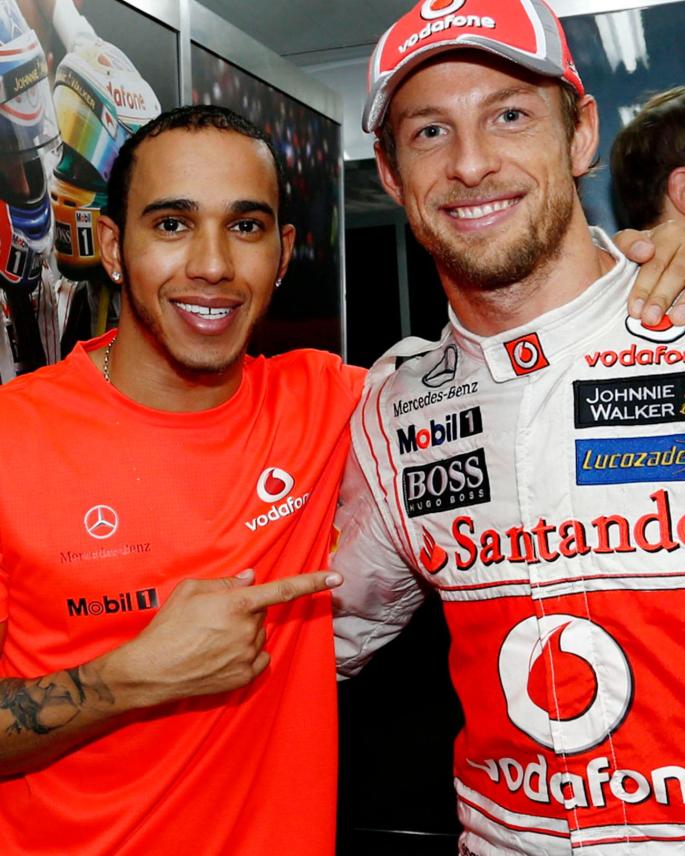
Best of enemies: Jenson with his former teammate and rival Lewis Hamilton
ALPHA PRESS
Explaining what underlay the awkwardness, Button says he and Hamilton were “just very different people” in terms of personality, friends and racing styles. Hamilton was quicker off the mark; Button smoother and more precise. Button might have added that they both had strong-willed father-managers.
So who was faster in their three seasons together, from 2010 to 2012? Button answers carefully: “I scored more points, and it’s all about scoring points, Formula One. You look at Ayrton Senna and Alain Prost, you’d say Ayrton was the quicker driver, but Alain was ‘the Professor’.
“He knew how to get to the end of the season with the most points. He never wanted a crash — he knew that that would lose him a lot of points — whereas Ayrton was the driver that was extremely fast but he would push it too far. As Alain said, Senna would ridicule him, but in doing so he put himself on the edge and he crashed. [Senna was killed in the 1994 San Marino Grand Prix.] So, yes, in Formula One it’s not just about outright speed; it’s about getting from A to B as fast as possible, not just one lap.”
With three drivers’ championships and 61 grand prix wins to his credit, Hamilton has outpaced Button’s single title and 15 wins. Button acknowledges his former teammate has an appetite for winning that he no longer possesses. “More and more I looked back at my career and realise I didn’t feel the same way as I guess Sebastian [Vettel] and Lewis must feel,” he writes. “I didn’t have a need to win title after title. I’d reached Formula One; become world champion. That hunger within me was satisfied.”
Button reflects: “There were no big goodbyes between us, but I look back on Lewis as one of the best and most challenging teammates I had.”
Richard Branson made unwanted advances towards Jessica Michibata, Button’s then-girlfriend
As our interview progresses, it becomes clear Button is escaping not just from his father’s death but from an accumulation of bad news. He was deeply affected by the skiing accident that left Michael Schumacher in a coma. Like his father only days later, the German former F1 champion suffered a head injury that left him fighting for his life.
“It’s horrific that a guy whose whole life has been in a dangerous sport, the most decorated racing driver in Formula One history, falls skiing and hurts himself in that way. It’s crazy, but we don’t choose when we have our accident or when we’re taken off this earth; it just happens.”
Did other drivers’ accidents — on or off the track — make him think: “There but for the grace of God go I”? “I’m not religious, so, no. But just looking at my father, what I learnt after his death is that you’ve just got to live in the moment. You’ve got to look after yourself, obviously, make sure your health is good, but just live in the moment. Don’t look at the negatives of the past — we all have pasts. It’s about living in the moment and then trying to enjoy it as much as you can.”
Button says there were off-track incidents, too, that added to “a dark period”. He and Michibata were robbed during the night while staying in a rented villa in St Tropez. Her engagement ring was snatched, but, more disturbingly, Button believes the intruders installed a covert camera and pumped anaesthetic gas through the air-conditioning to stop the couple waking up.
“The worst thing is, I don’t mind losing stuff. They can take what they want. It’s just you’re fearful of something else happening — the safety of your loved ones. The [French] police said: ‘What? You don’t have security?’ I said: ‘I didn’t think we’d have to — it’s the south of France.’ I don’t want to be walking around with security the whole time: that’s definitely not me. I’m still the boy from Frome. I haven’t stayed in a house in the south of France since.”
While he tiptoes around his feud with Hamilton, Button doesn’t mince words about Sir Richard Branson, describing in his memoir the disquiet with which he and teammates at Honda reacted to the news in 2008 that Branson might be their new boss.
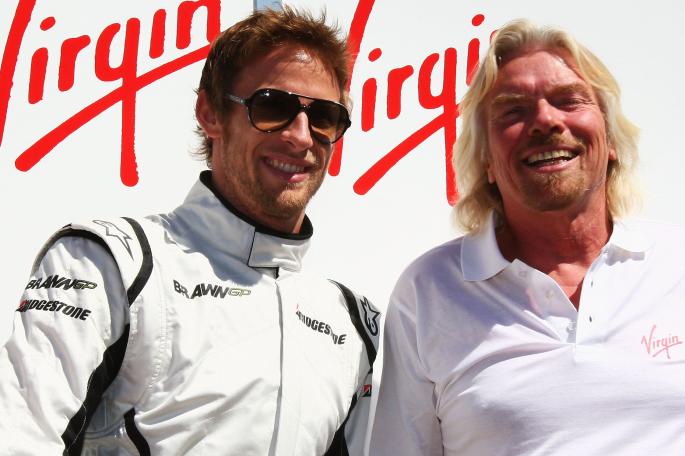
Fast and furious: Button argued with Branson over his then girlfriend, who Branson approached on a drunken night out
CLIVE MASON
“We thought Branson was a bit of a turkey,” he recalls. His doubts were reinforced by an incident at a restaurant in Melbourne on the eve of the Australian Grand Prix in 2009. Branson made unwanted advances towards Michibata while Button was away from the table.
Afterwards Branson “tottered over to a party of diners, one of whom, unaware of how drunk he was, handed him a baby, hoping to get a picture of him holding it”, Button recalls. “Sir Richard not only proceeded to pick up and cuddle the baby but staggered around the restaurant [while] various people were trying to talk him out of it — ‘Richard, please put the baby down’ — until at last he returned the child and left the restaurant, to everybody’s great relief.”
Branson later apologised to Button for the incident with Michibata. “I was talking to her. I was drunk. Jenson didn’t like it,” the tycoon said recently.
“I didn’t drink for six months after that night.”
Some may regard Button’s criticism of Branson’s excesses as the pot calling the kettle black, given his own reputation as a party animal and lothario. As well as his short-lived marriage to Michibata, he called off a planned wedding in 2005 to Louise Griffiths, a singer and Fame Academy contestant.
“I had two serious girlfriends and a handful of less serious girlfriends in 10 years, [which] hardly makes me Warren Beatty,” he recalls. “I’m one of those people who like to be in a relationship — a serial monogamist.”
Of the break-up with Michibata, he says: “It was amicable. We both realised that things hadn’t been right and it was a mistake to marry in the first place.”
Now that he’s settled in LA, what is his next move? Clearly Jenson likes the lifestyle and the climate, although when the sun at the poolside gets too warm he moves inside the house to continue the interview.
The Sunday Times Magazine podcast: Jenson Button and the secret life of restaurant critics
He made a brief reappearance in F1 in May, which sealed his decision to quit. “I did my one race this year in Monaco, which I enjoyed, but I also realised that while I love the driving part, it was just too intense. There were negative questions, and I thought: ‘I don’t understand why there’s negativity.’ That proved to me I’d done the right thing.”
He is in training for triathlons and Ironman competitions and his eyes have turned to other branches of motor sport, including the world’s toughest endurance race — the Le Mans24 Hours. “That’s something I’d love to do — I love that team atmosphere. For me, it’s something very special, working with drivers closely, working with the mechanics.”
Browse NEW or USED cars for sale
Indeed, there’s something in his more weathered appearance, his steelier manner, that is starting to resemble Michael Delaney, Steve McQueen’s hard-bitten antihero in the 1971 film Le Mans. Is that how he sees himself?
“I still love racing, and that bug has really come back now I’ve had a few months off. So I’ll race in something — it just won’t be in Formula One.”
Will he miss it? “To have raced in Formula One for 17 years and won a world championship, won many grands prix, raced with some of the best drivers the sport has seen — I have so many memories.
“That’s the important thing: you go there with dreams and you come away, hopefully, with good memories. And I do.”
My father, the hero
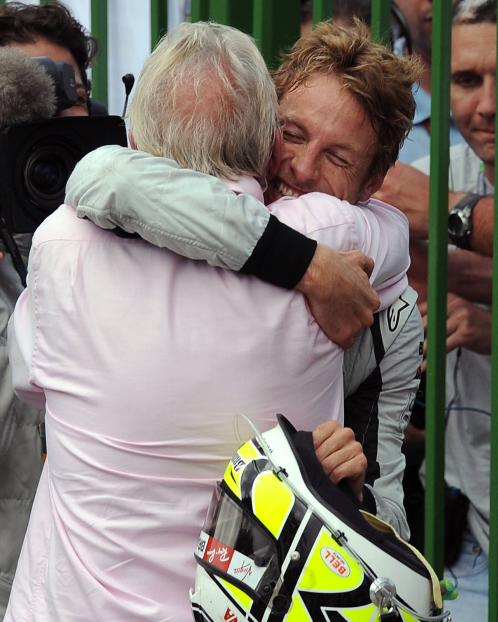
Jenson embracing his father after his victory
VANDERLEI ALMEIDA/AFP/GETTY
It was getting to me, the pressure. It was October 2009 and maybe I had lost my nerve.
Do they all have these doubts? All the drivers who have been in my position, on the brink of the world drivers’ championship, were they, too, tortured by the fear of failure?
I joined the old man in the hotel bar for a drink. “Dad, I’ve got to win it this weekend,” I told him. He smiled at me. He could see it was getting to me. The smile said, “You’ll be all right, Jense.”
That night I had a dream — I’d won the world championship. It should have been a nice dream, really, but it wasn’t, because when I woke up I hadn’t won the world championship. The important thing was, though, that I was still in the lead. Every single point I’d earned was vital in keeping me ahead of the pack.
The fans at the Brazilian Grand Prix circuit were desperate for me to fail. Kitted out and ready to race, I steered the car to the dummy grid, parked up, got out and took off my helmet — only to be greeted by a chorus of boos from the pit-straight grandstand opposite. No two ways about it, I needed points.
Lights out. I made a better start than the Renault and made up a place right off the line. The first lap was mayhem: seven drivers involved in minor scrapes.
Heikki Kovalainen pitted, followed closely by Kimi Raikkonen, who needed a new front wing after tangling with Mark Webber. Kovalainen finished his stop, but was released with a fuel hose still attached to his car. Behind him came Raikkonen, whose exhaust ignited the fuel, causing a fire on the track.
All came under control and both drivers rejoined and finished the race. Then, with eight laps to go, [my Brazilian rival] Rubens Barrichello had some kind of tangle with Lewis Hamilton and went into the pits with a puncture, falling to eighth. I was in fifth.Which meant, if it stayed the same, the championship was mine. A strange calm had come down on me. At the finish line, the team were on the pit wall, cheering and clapping, I was singing Queen’s We Are the Champions into the radio (a good rendition, I thought).
As I jumped out of the car, I was greeted by the sound of the crowd cheering, which knocked me for six. They’d spent days jeering me yet in that moment they were gracious and supportive.
And then I saw Dad. There he was in his pink shirt and shades and in the next instant we were in each other’s arms, father and son. Our journey together had begun with a junior bike one cold morning and brought us here, to the world championship.
We’d given each other such an incredible experience and I could feel all that pride and joy pouring off him.
“About time,” said Bernie Ecclestone. Nigel Mansell had 176 starts before he became world champion in 1992; it took me 169, the second-longest. That night, however, as I sat in my room with the party going on some floors below, what I thought about most was that journey — the one Dad and I had made together. A childhood dream of becoming world champion. I fell asleep and, when I awoke the next morning, the dream was real.
© Jenson Button 2017
Extracted from Life to the Limit, My Autobiography, to be published on Thursday (Blink Publishing £20)
Write to us at driving@sunday-times.co.uk, or Driving, The Sunday Times, 1 London Bridge Street, London SE1 9GF


